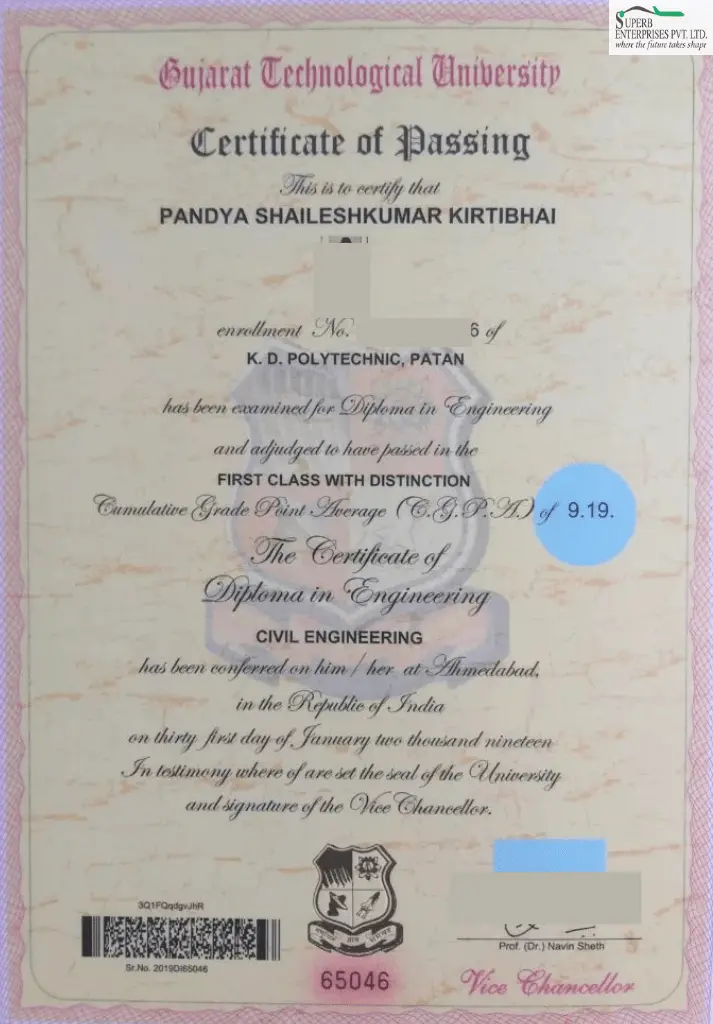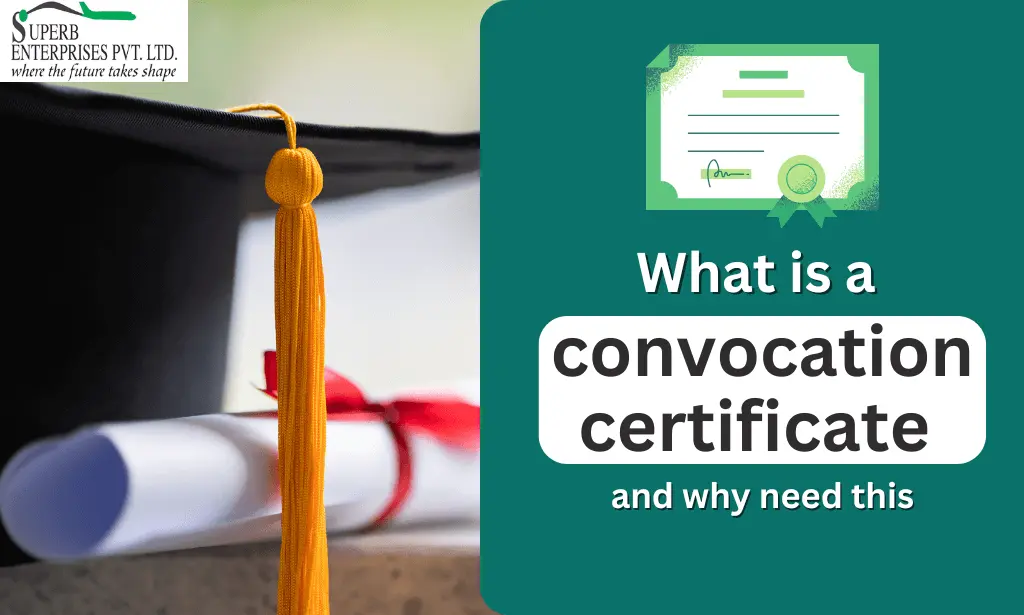The convocation ceremony of the most precious memories for any student during their educational journey. During these celebrations and joyous moods, a student is conferred with a convocation certificate. Now, what exactly is this paper, and why is it an important one?
Imagine obtaining a document that symbolises years of hard work, sleepless nights, and endless achievements – a certificate that marks your transition from a student to a graduate.
This is what a convocation certificate symbolises. It is an achievement treasured by all the students who finish their academic journeys. A convocation certificate also plays an important role for students in many scenarios such as pursuing higher education, applying for their dream job, or immigrating to a foreign country.
In this guide, we’ll go over everything you need to know about this very important document. We will especially cover What is Convocation Certificate, its importance, how to obtain it, and how to use it in the best possible way. Be sure to read it thoroughly to better understand a “convocation certificate”.
What is Convocation Certificate?
A convocation certificate is an official document issued to students during their graduation ceremonies. It is a document proving that the student has successfully completed their course and met all academic and extracurricular requirements set by the institution.
Although the ultimate proof of qualification is in the degree certificate, the convocation certificate serves as an interim document and is often issued when it may take some time before the degree certificate is released.
Usually, a university issues a convocation certificate right after graduation and it is valid until the original degree certificate is provided to the students.
Convocation Certificate Demo –

Why Do You Need a Convocation Certificate?
A convocation certificate is of the utmost importance, especially for recently graduated students. Here are some of the most important reasons why you need a convocation certificate
- Proof of Graduation – A degree certificate takes time to be issued, until then a convocation certificate serves as a temporary proof of graduation.
- Employment Opportunities – Many employers require candidates to provide proof of their qualifications. A convocation certificate can help you secure a job while waiting for the degree certificate.
- Higher Education – Many students pursuing higher education need to submit a convocation certificate to secure admission. It is the most common use of a convocation certificate.
- Visa and Immigration – International study programs and employment seekers, mostly need a convocation certificate as evidence of graduation while applying.
- Government Tests – Candidates preparing for competitive exams to avail government jobs or scholarships need educational proof. In that scenario, a convocation certificate is useful until the degree certificate becomes available.
- Verification of Document: The concerned organizations or institutions might also ask for the convocation certificate while verifying backgrounds or credentials during verification procedures.
How to Get a Convocation Certificate?
There are certain easy ways through which a student can obtain their convocation certificate. Here are a few examples;
- Attend the Convocation Ceremony – A majority of the universities issue the convocation certificate on the occasion of a formally held convocation. Get registered for the occasion and attend the same according to your college’s instructions.
- Apply Online (If You Cannot Attend the Ceremony) – In case one is not available to attend the ceremony, most universities allow an online application through which students can ask for the issuance of their certificates. A certificate applied through an official portal would then arrive through courier or you can collect it in person if possible.
- Contact University Administration – If you have missed the convocation event or require further assistance then visit or contact the administrative office of the university. They will guide us about alternative arrangements for collecting certificates.
Note: Some universities ask for a small amount for re-issuance and dispatching of the convocation certificate. Please check in advance for payment details and complete the required formalities to avoid delayed delivery.
Steps How to Apply for a Convocation Certificate
The procedure to apply for a convocation certificate is college/university specific.
- Visit the University Portal – Many universities have dedicated portals for dealing with all queries related to certificate issuance. To do this process, you will need to log onto your student portal with proper credentials.
- Fill out the application form – Enter correct information like your name, enrollment number, course, and contact details. Make sure all the information is correct so that there is no delay.
- Upload Required Documents – Documents such as proof of identification, mark sheets, or course completion certificates should be submitted. Confirm the document requirements beforehand.
- Pay the Fees – The next step is to pay the applicable fee to the university. This fee facilitates certificate issuance and delivery.
- Submit the Application – After filling in all the information, uploading the documents and paying the fee, submit the application. Save the acknowledgement receipt for future reference.
By following these steps, you can apply for the convocation certificate efficiently. Remember to cross-check the college-specific requirements before submitting the documents.
Common Hurdles in Obtaining a Convocation Certificate
Despite the importance of the certificate, getting a convocation certificate at times becomes a difficult job. The common problems faced include:
- Delay in Issuance – Due to administrative backlogs universities at times may take too long in issuing the certificates. Although it happens rarely, it may cause a lot of issues for the students.
- Incorrect Information – Always ensure that the certificate contains the correct name, enrollment number and other similar information. Incorrect credentials will deem the certificate unusable.
- Non-Attendance of Ceremony – Students who miss the convocation event will have to undergo some extra steps to get the certificate.
- Non-Compliance with Requirements – Failure to submit necessary documents or pay the applicable fees can lead to delays or rejection of the application for the certificate.
Prepare in advance and keep all the necessary documents ready to avoid the common hurdles you may face during the issuing process of a convocation certificate.
What is the Differences Between a Convocation and a Degree Certificate
Although both certificates are related to academic achievements, there are certain key differences between the two. The main differences Differences Between a Convocation and a Degree Certificate are explained below;
| Criteria | Convocation Certificate | Degree Certificate |
|---|---|---|
| Purpose | Issued as proof of completion of a course, generally provided right at the time of graduation. | The official document proving you have earned a particular degree. |
| Issuance Timeline | Issued immediately or shortly after graduation. | Takes several months to be issued. |
| Recognition | Temporary proof of graduation. Typically valid until the original degree certificate is issued. | Legally acceptable as proof of academic qualification. |
| Uses | Used at preliminary levels like applications or for higher studies until the original degree certificate is issued. | Required at official levels for employment, admissions to higher education institutions, etc. |
| Design and Format | Simple design with primary details such as the student’s name, course studied, and date issued. | Elaborate documents with advanced security features, embossed seals, and signatures of high authorities to avoid forgery. |
| Validity | Valid until the degree certificate is released. | Lifetime validity and accepted in all places as evidence of education completion. |
Does a Convocation Certificate Require Attestation?
Attestation is the authentication or verification process that determines whether the document in question is legal and valid. Generally speaking, a convocation certificate does not need to be attested, but sometimes it’s needed. Mentioned below are certain scenarios in which the convocation certificate attestation may be required;
- International Application – Some countries require the attested convocation certificate for offering employment or higher education purposes. It is usually the case when a candidate applies soon after graduation.
- Lost Degree Certificate—If the original degree certificate is lost or unavailable, an attested convocation certificate may be considered valid instead.
For Convocation certificate attestation, follow these steps;
State HRD Attestation – Initially, the State HRD verifies and authenticates all Educational certificates and confirms their legitimacy with the HRD attestation stamp.
MEA Attestation – Once the State HRD confirms the authenticity of the convocation certificate, it is sent to the Ministry of External Affairs (MEA). After further scrutiny, the MEA validates the document with an attestation stamp.
Embassy Attestation – In the final step, the convocation certificate is authenticated by the destination country’s embassy, which validates its legitimacy and allows it to be used overseas.
Importance of Maintaining Your Convocation Certificate
Maintaining your convocation certificate in good condition is crucial. Here’s why:
Easy Access – if it is maintained well and kept safe then you can easily access it when you want.
Avoid applying again – The reissue process is time-consuming and costly.
Professional Requirements – Most organisations require immediate submission of academic documents during hiring.
Application to Higher Education Institution – For all international programs, universities normally demand that the documents remain ready for applications. Since a degree certificate takes time, a convocation certificate comes to the rescue.
Processes of Visa and Immigration – Often, while submitting applications or for formalities during immigration, a convocation certificate may be required.
Conclusion
The convocation certificate, therefore, is an essential bridge between graduation and issuance of the degree certificate. An understanding of its importance and procedures in acquiring and maintaining it saves graduates from potential administrative hassles. Whether in the application process for a job, further studies, or legal documentation, it helps graduates make smooth transitions at crucial junctures in life.
Always make sure you keep your convocation certificate safe. It may just come in handy in an emergency.
Frequently Asked Questions
- Are convocation and degree certificates the same?
No, they are two separate certificates. A convocation certificate is a temporary proof of your completion of a course of study. Whereas, a degree certificate is an official document that proves your academic achievement.
- Is a convocation certificate important?
Yes, it is an important document for graduates. A convocation certificate proves helpful in academic and professional life.
- What is the use of a convocation certificate?
A convocation certificate is used in many scenarios such as;
- securing admission to higher education institutions
- applying for jobs
- helping with visas and immigration
- Proof of graduation
- Is a convocation certificate necessary for jobs?
It depends on the scenario and when someone is applying for a job. Employers generally demand a degree certificate but if someone is applying for a job right after graduation then they would need to submit a convocation certificate to secure the job as a degree certificate takes a few months to be issued.
- Why do universities or visa offices ask for Convocation Certificates?
Universities and visa offices require convocation certificates just to ensure that the student has completed his or her respective academic qualifications. Convocation certificates prove educational authenticity and eligibility for admission, employment and other legal requirements.
